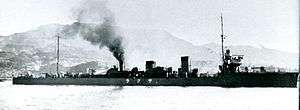Japanese destroyer Tachibana (1912)
For other ships with the same name, see Japanese destroyer Tachibana.
 Sister ship Sakura at Sasebo, 1918 | |
| History | |
|---|---|
| Name: | Tachibana |
| Builder: | Maizuru Navy Dockyard |
| Laid down: | 29 April 1911 |
| Launched: | 27 January 1912 |
| Fate: | Scrapped 1933 |
| General characteristics | |
| Class and type: | Sakura class |
| Displacement: |
|
| Length: | 83.6 m (274 ft) |
| Beam: | 7.3 m (24 ft) |
| Draught: | 2.2 m (7.2 ft) |
| Propulsion: | reciprocating engines, 9,500 ihp (7,100 kW) |
| Speed: | 30 knots (56 km/h; 35 mph) |
| Range: | 2,400 nautical miles (4,400 km; 2,800 mi) at 15 knots (28 km/h; 17 mph) |
| Complement: | 92 |
| Armament: | |
Tachibana (橘) was a Sakura-class destroyer of the Imperial Japanese Navy.
Design
Tachibana and her sister ship Sakura were at first planned to be large ocean-going vessels however due to financial problems they were redesigned to a smaller type. Unlike the preceding Umikaze class, which was powered by Parsons turbines, Tachibana was installed with vertical expansion engines.
Service
The ship, built at the Maizuru Naval Arsenal, was launched in 1911, completed in 1912, and entered service shortly afterward. After 20 years of service, Tachibana was decommissioned in 1932 and scrapped in 1933.[1]
References
- Conway's All the World's Fighting Ships, 1922-1946
This article is issued from Wikipedia - version of the 3/8/2016. The text is available under the Creative Commons Attribution/Share Alike but additional terms may apply for the media files.